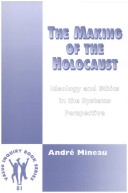Value Inquiry Book Series / Holocaust and Genocide Studies
2 primary works
Book 81
What made the Holocaust possible? What does it mean from a moral viewpoint? These two questions constitute the main focus of this book. Through concepts borrowed mostly from systems theory, an attempt is made at establishing a theoretical framework for a broad understanding of the genesis of the Holocaust. More specifically, the relationships between ideology, political power, and genocide are discussed, and the following topics are covered: (1) the constitution and the historical evolution of the ideology of the Holocaust, through the genesis of anti-Semitism, the impact of the modern paradigms, and the apparent peculiarities of Nazism; (2) the emergence of powerful means of action designed for implementing the ideology, in the context of totalitarianism; (3) control and freedom as the basic parameters in a decision-making process that went along with a "diffuse Holocaust" phase and generated mechanisms of extensive cooperation; (4) the values and norms that made sense to the Nazis in relation to the Holocaust, with a critical assessment of Nazi ethics insofar as it aimed at subverting the concept of evil and at destroying the self. This book deals with four key dimensions of the Holocaust: ideology, power, act, and meaning.
Book 247
SS ideology was the expression of an apparently philosophical self-containing system of thought, articulated around a systematic body of knowledge claiming to integrate humanity inside a global vision of Being. Using ontology and anthropology as foundations, SS thinking developed essentially in the field of ethics. It portrayed itself as a global approach to society and civilization, based on eugenics and ethnic cleansing. It accomplished the fusion of the modern biological paradigm with the cultural shock brought about by World War I and promoted total war for the sake of total health. And since institutional philosophy largely ignores SS theory and praxis, Holocaust memorial institutions may represent an alternative for the development of understanding and reflection.
Within the context of Nazism, SS thinking did much to work out the theory for which the Holocaust would be the ultimate accomplishment. It intended to provide the Holocaust with legitimacy, from the viewpoints of ontology, anthropology, politics, and ethics, whence the importance of studying the theoretical framework that gave sense to the most terrible form of SS praxis.
Within the context of Nazism, SS thinking did much to work out the theory for which the Holocaust would be the ultimate accomplishment. It intended to provide the Holocaust with legitimacy, from the viewpoints of ontology, anthropology, politics, and ethics, whence the importance of studying the theoretical framework that gave sense to the most terrible form of SS praxis.

